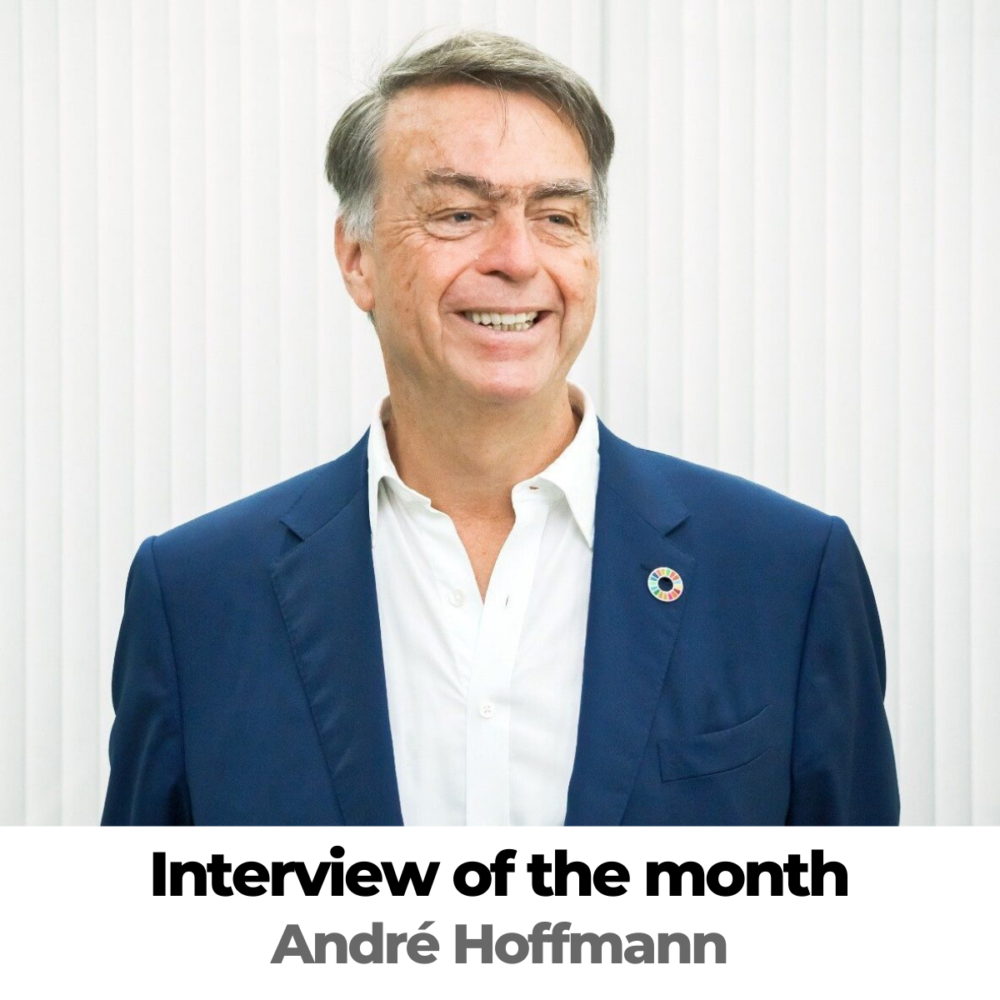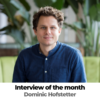
Interview of the Month: André Hoffmann
This month we had the great opportunity of interviewing André Hoffmann, a strong champion of sustainable business and an inspiring leader paving the way for new models of collaboration and action. We asked him about a range of catalytic initiatives he is involved with including a new Nature Finance that will make Switzerland a pioneer in this crucial area of sustainable finance.
André Hoffmann is a businessman, environmentalist and a passionate advocate for business as a force for good. André is Vice Chairman of Roche Holding AG, the family business. He also sits on the Board of SystemIQ, the Board of Trustees of the World Economic Forum. André has a distinguished career in nature conservation and sustainability. He is the President of Fondation Tour du Valat and board member of Capitals Coalition. He is also Chairman of the Advisory Board of the Hoffmann Institute at INSEAD.
1. At Building Bridges 2024, you announced that there are plans developing to launch a Swiss Global Hub for Nature Finance. How will it function and what will be the objectives of the Hub?
I’m incredibly excited about the Swiss Global Hub for Nature Finance, which we announced at Building Bridges in December 2024. My hope is that it becomes a dynamic catalyst, uniting capital providers, entrepreneurs, policymakers, scientists, and civil society around one guiding principle: we must invest in nature if we want a thriving future. In practical terms, the Hub will act as a platform that pools expertise and resources while identifying high-impact projects. By fostering active collaboration—rather than confining each stakeholder to their own silo—we can spark real change. Three core objectives are driving this initiative. First, we want to unlock and mobilize capital. I’ve seen firsthand the abundance of promising nature-positive projects out there, and I believe we can connect them with mainstream finance, philanthropic contributions, and public support. Second, the Hub will build and share knowledge by providing the data and frameworks necessary to make nature integral to financial decision-making. By translating complex research into practical frameworks, we’ll make it easier for financial institutions to integrate nature into their day-to-day decisions—and show them that such integration isn’t just good for the planet, but also strengthens long-term returns. Finally, we aim to set standards and inspire change by advocating for consistent reporting and accountability. If we can show the clear business case and measurable impact of nature-based solutions, I’m convinced more organizations will embrace a nature-positive approach.
2. What will be the priority areas of work for the Hub and how do you hope they advance nature finance in Switzerland?
I see the Hub focusing on three key areas that build on Switzerland’s strengths in finance, innovation, and collaboration. First, viewing nature as vital infrastructure opens new avenues for investing in ecosystems as we would any critical asset—an approach and mindset I believe are essential for long-term resilience. Second, tapping into the global bioeconomy can drive sustainable growth and support local communities, a cause I’m particularly passionate about. And finally, we must nurture the next generation of nature finance experts through dedicated practitioner development. While it’s still early days, I’m convinced that by rallying diverse stakeholders—across finance, policy, technology, and education—we can establish a blueprint that not only protects nature but also proves its value to our shared prosperity.
3. You recently published a book called “The New Nature of Business: The Path to Prosperity and Sustainability” which builds on various sustainability lessons you have learned in your own leadership roles and from other corporate leaders. What do you hope other corporate leaders take from the book and how would you like to see them act?
I wrote The New Nature of Business to show that genuine, long-term success hinges on more than financial results—it depends on respecting and regenerating our social, human, and environmental capital. In my view, profit and purpose are deeply interlinked: when we see nature not as a resource to be exploited but as a partner in value creation, we unlock new avenues for innovation and resilience. I’d like leaders to move beyond short-term thinking and mere compliance, weaving sustainability into the very fabric of their strategies. From my experiences at Roche to the concrete case studies of companies like IKEA and Schneider Electric, it’s clear that measuring success with fresh metrics and placing purpose at the center not only drives impact but also draws top talent. Ultimately, if we embrace this broader vision of prosperity—one that values people and planet alongside profit—we ensure our businesses remain relevant and become genuine forces for positive change.
4. You are the co-founder of InTent, which aims to build collaboration and connect people to accelerate nature-positive initiatives. What do you see as the biggest barriers to collaboration across sectors (corporate, nonprofit, government), and how do you overcome these barriers to make long-term impact?
InTent is founded on the belief that real system-wide change requires genuine collaboration across all sectors—corporate, nonprofit, and government. One of the biggest barriers we face is the siloed thinking that still pervades much of the business, academic and policy world. Each sector often has different priorities, timelines, and languages of success, which can hinder collective progress. To overcome this, we have to align on a shared purpose and acknowledge our interdependence. This starts with building a culture of transparency and trust, where businesses recognize the expertise of civil society, and policymakers understand the critical role of the private sector in driving innovation. It also involves setting clear, measurable goals—for example, achieving net-zero emissions or restoring biodiversity within specific timeframes—and ensuring each stakeholder has a tangible role in the solution. Most importantly, we must be willing to learn from one another. By bringing these strengths together under a unifying vision for a nature-positive economy, we create long-term impact that no single entity could achieve on its own. When we view collaboration as an investment in resilience and societal well-being, rather than a cost, genuine partnership becomes not just a moral imperative but a strategic necessity.
5. InTent put on a compelling program on the sidelines of the recent World Economic Forum Annual Meeting 2025. What were the key outcomes or actions that came out of the SDG Tent?
This year, we introduced a new format based on action-focused workshops, and the response was overwhelmingly positive. It brought together a wide range of voices—from CEOs and policymakers to scientists and grassroots leaders—and allowed for more dynamic, transparent discussions on how to speed up progress. The big takeaway was that nature-positive strategies are gaining momentum, and there’s a growing willingness to measure and disclose impacts in a systematic way. We also reinforced the need for collaborative leadership, recognizing that if one player remains stuck, it impacts everyone. Above all, participants left with a renewed sense of urgency and the conviction that the cost of inaction far outweighs any hurdles we face in moving forward together.

